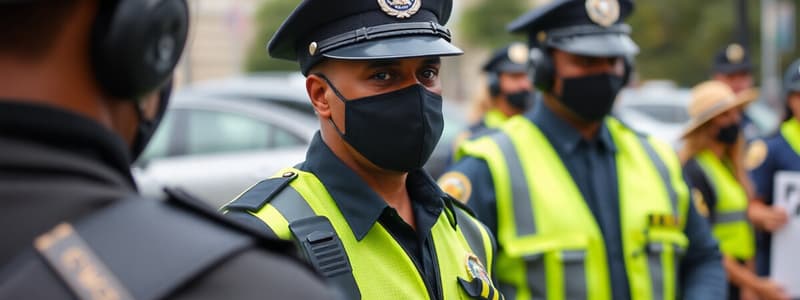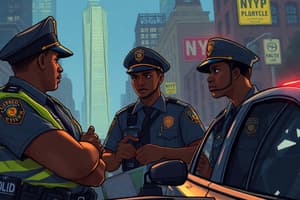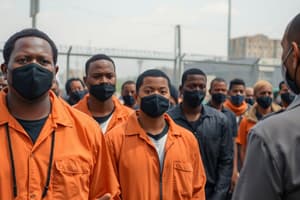Podcast
Questions and Answers
What was the relationship between racial profiling efforts and the likelihood of police searches of black drivers in North Carolina before 1997?
What was the relationship between racial profiling efforts and the likelihood of police searches of black drivers in North Carolina before 1997?
- Racial profiling had no impact on the number of searches of black drivers.
- Police searches were uniform across all racial groups.
- Black drivers were less likely to be searched than white drivers.
- Black drivers were more likely to be searched compared to white drivers. (correct)
What effect did the challenges to racial profiling have on police behavior in North Carolina?
What effect did the challenges to racial profiling have on police behavior in North Carolina?
- Police searches of all drivers increased regardless of race.
- Police officers became more aggressive in conducting searches.
- There was no change in police search practices.
- The number of searches of black drivers decreased significantly. (correct)
By 2000, what was observed about the recovery of contraband during police searches of drivers in North Carolina?
By 2000, what was observed about the recovery of contraband during police searches of drivers in North Carolina?
- Contraband recovery rates were higher among black drivers.
- Contraband recovery rates differed significantly by race.
- Contraband recovery rates were no longer influenced by the driver's race. (correct)
- More contraband was found in searches of black drivers than white drivers.
How did the rate of contraband found in searches of black drivers in North Carolina in 1997 compare to that of white drivers?
How did the rate of contraband found in searches of black drivers in North Carolina in 1997 compare to that of white drivers?
What constitutional principle was violated by the racial profiling practices known as Operation Pipeline?
What constitutional principle was violated by the racial profiling practices known as Operation Pipeline?
What is a significant factor contributing to high rates of racially biased stops according to the studies mentioned?
What is a significant factor contributing to high rates of racially biased stops according to the studies mentioned?
How do aggressive police patrol patterns impact minority communities?
How do aggressive police patrol patterns impact minority communities?
In the studies referenced, what relationship was found between the racial composition of neighborhoods and the rate of stops for African American drivers?
In the studies referenced, what relationship was found between the racial composition of neighborhoods and the rate of stops for African American drivers?
What is a common pattern in police patrols regarding racial profiling?
What is a common pattern in police patrols regarding racial profiling?
Which of the following sources of bias is considered less common in police vehicular stops compared to organizational factors?
Which of the following sources of bias is considered less common in police vehicular stops compared to organizational factors?
What behavior is often reported by African American drivers in relation to their interactions with police in white neighborhoods?
What behavior is often reported by African American drivers in relation to their interactions with police in white neighborhoods?
What has been observed regarding prejudice against African Americans in police stops over time?
What has been observed regarding prejudice against African Americans in police stops over time?
Flashcards are hidden until you start studying
Study Notes
Racial Profiling
- Racial profiling is a practice that targets individuals for law enforcement based on their race or ethnicity.
- This practice has been challenged both nationally and locally, leading to changes in police behavior, particularly within highway patrols.
Impact of Civil Rights Challenges
- In North Carolina, before civil rights challenges were mounted, black drivers were four times more likely than white drivers to be stopped and searched by the highway patrol.
- Following civil rights challenges, the search rates of black drivers significantly decreased, with racial disparities in searches being cut in half by 2000.
Operation Pipeline
- Operation Pipeline, a controversial program, targeted minorities for drug offenses.
- This program violated the principle of equal protection under the law by disproportionately targeting minority individuals.
Factors contributing to racial disparities in policing
- Police patrol patterns: Communities with higher crime rates often have a more pronounced police presence, leading to a greater number of stops in those neighborhoods. However, this can exacerbate racial disparities if minority communities are disproportionately affected by crime.
- Calls for service: Calls for service from white residents regarding minorities being "out of place" in their neighborhoods can also contribute to racial disparities in policing.
Implicit Bias
- Unconscious biases are prevalent in society, where people often categorize individuals based on stereotypes, leading to discriminatory behavior.
- While explicit racism is less common, implicit biases against minorities are widespread, influencing police decisions like stops and searches.
Local Versus Highway Patrol
- Local police officers, who engage in more routine patrols, are more likely to exhibit unconscious bias in their stopping decisions compared to highway patrol officers.
- Studies show significant racial disparity in stops by local police, with African Americans stopped at a much higher rate than white drivers, even when taking driving behavior into account.
Addressing Implicit Bias
- Holding management accountable for equal employment opportunities is an effective strategy for reducing bias in the workplace.
- Similarly, active monitoring and management of police officers based on their racial composition of stops and searches can effectively reduce implicit bias among police.
Role of Citizen Review Boards
- Citizen and police review boards can play a proactive role in observing both individual police behavior and problematic organizational practices.
- They can utilize data on racial disparity in police stops to identify areas where organizational practices are contributing to discrimination.
Importance of Civil Rights Enforcement
- Aggressive enforcement of civil rights laws can encourage local police departments to address prejudice and discrimination within their organizations.
- Federal lawsuits against cities and states with persistent patterns of racially biased policing can send a clear message that the harassment of minority citizens is unacceptable.
Obama Era and Racial Profiling
- President Obama's administration has the potential to address racial issues in policing due to his own experiences and the political capital he holds.
- The federal justice department has historically played a crucial role in both creating and confronting racial profiling.
- The Obama administration's approach to racial profiling and police practices will be of great interest in understanding the future direction of racial justice in the United States.
Studying That Suits You
Use AI to generate personalized quizzes and flashcards to suit your learning preferences.




